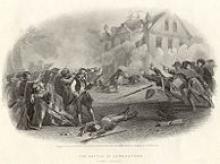- CAC Home
-
About CAC
-
CAC Senior Leaders
Commanding GeneralCombined Arms CenterLTG Milford H. Beagle Jr.Deputy to the
Commanding GeneralCombined Arms CenterMr. Gregg Thompson
Command Sergeant MajorCombined Arms CenterCSM Stephen Helton
Chief of StaffCombined Arms CenterCOL Trent D. UptonCommand Chief Warrant OfficerCombined Arms CenterCW5 Aaron H. Anderson
Deputy
Commanding GeneralCAC ARNGBG Charles MorrisonDeputy
Commanding GeneralCAC USARBG Katherine A. TrombleyDeputy Commanding General - EducationArmy UniversityBG David FoleyDeputy Commanding GeneralCAC - TrainingBG Scott WoodwardDirectorMission Command Center
of ExcellenceCOL Bryan Babich
-
CAC Senior Leaders
-
Organizations
-
CAC HQ
-
CAC Subordinate Organizations
- The Army University (Army U)
- Combined Arms Center - Training (CAC-T)
-
Mission Command Center of Excellence (MCCoE)
- Leadership
- Mission Command Resources
- SharePoint
- Army Joint Support Team (AJST)
- Air Land Sea Space Application Center (ALSSA)
- Combined Arms Doctrine Directorate (CADD)
- Center for Army Leadership (CAL)
- Directorate of Training (DOT)
-
Force Modernization Proponent Center (FMPC)
- Command and Control Integration (C2I)
- Security Force Assistance Proponent (SFAP)
- Contact Us
- Peacekeeping & Stability Operations Institute (PKSOI)
-
Key Partner and Supporting Units
- » Fort Leavenworth Garrison
- » Presidio of Monterey Garrison
- » 902d Military Intelligence Group
- » Munson Army Health Center (MAHC)
- » Joint Center for International Security Force Assistance (JCISFA)
- » U.S. Disciplinary Barracks
- » Community Health Promotion Council (CHPC)
- » Red Team Education
- Contact Us
- Training & Doctrine Command (TRADOC)
- Mission Command Capability Development and Integration Directorate
- 15th MP Brigade
- Centers of Excellence
- Branch Schools
-
Non-Branch Schools
-
Command and General Staff College (CGSC)
- Leaders
- Mission & Vision
- Students
-
Command and General Staff School (CGSS)
- Inbound Class Information
- Department of Distance Education (DDE)
- Department of Command and Leadership (DCL)
- Department of Sustainment and Force Management (DSFM) (Previously DLRO)
- Satellite Campus Program
- Air Force Element (AFELM)
- Navy Element (NAVELM)
- Marine Corps Element (MCELM)
- International Military Student Division (IMSD)
- Contact Us
- School of Advanced Military Studies (SAMS)
- School for Command Preparation (SCP)
- Sergeants Major Academy (SGM-A)
- CGSC Degree Programs
- Registrar
- CGSC News Archive
- Contact CGSC
-
Warrant Officer Career College (WOCC)
- About USAWOCC
- Warrant Officer Program
- Warrant Officer Blackboard Enrollment
- Warrant Officer Courses
- Benefits, Pay, and financial Matters
- Fort Rucker Information
- News/Media
- Retirement/Transition Links
- Warrant Officer Career College Contact Information
- Center for the Army Profession and Leadership (CAPL)
- Western Hemisphere Institute for Security Cooperation (WHINSEC)
- SHARP Academy
- U.S. Army Sergeants Major Academy (USASMA)
- The U.S. Army Inspector General School (TIGS)
-
Command and General Staff College (CGSC)
-
CAC HQ
- References
- Products & Resources
A Complex Plan and Failure to Surprise: George Washington and the Battle of Germantown (1777)
After losing New York City in summer and fall 1776, Washington’s Continental Army managed two unexpected victories over the British at Trenton and Princeton. This raised the hopes and expectations of Congress. Though Washington continued to argue that his inexperienced army warranted a cautious strategy, the Congress insisted he seize the initiative. Thus, when British General Howe advanced on the American capitol in Philadelphia, Washington felt compelled to fight. In September 1777, the Continentals attempted to block the British advance and suffered an embarrassing defeat at the Battle of Brandywine. The stage was set for Washington to attempt one more aggressive counter attack.
When Lord Howe left a small garrison in Philadelphia and sent the main body on to Germantown, Washington hoped to surprise and divide the British force, much as he had at Trenton in December 1776. Unfortunately, Washington had been right about the inexperience of his force and had concocted an overly ambitious and complex plan. Washington split his army into four columns, each of which would have to coordinate and simultaneously converge on Germantown at dawn on the 4th of October.
However, moving in the dark, along four separate roads, the Continental columns failed to reach their objectives before daylight. The element of surprise was lost. Furthermore, a thick fog caused confusion when the two main regular army columns struck the British pickets outside Germantown. This caused two major disasters.
First, when a company of 120 British regulars barricaded themselves in a mansion rather than retreat, Washington felt compelled to lay siege to and storm the fortified position so as not to leave any enemy element in his rear. Unfortunately, the thick walls of the compound withstood General Henry Knox’s light artillery barrage, and scores of Continentals were killed and wounded in several unsuccessful assaults on the mansion.
Second, hearing the artillery fire on the mansion behind their lines, another column of attacking Continentals feared enemy in their rear and delayed the assault. Furthermore, the movement of two columns through thick fog caused a major instance of fratricide and an ignominious retreat.
As the British fiercely flanked and counterattacked the remaining American column, one regiment of Virginia regulars were cut off and forced to surrender. The rest of the Continental Army withdrew intact in fairly good order, though they were briefly pursued by Howe’s forces. Howe, however, again failed to follow-up on or exploit his victory, and though a tactical victory for the British, the survival of the Continental Army impressed the French and helped motivate their intervention on the American side.


